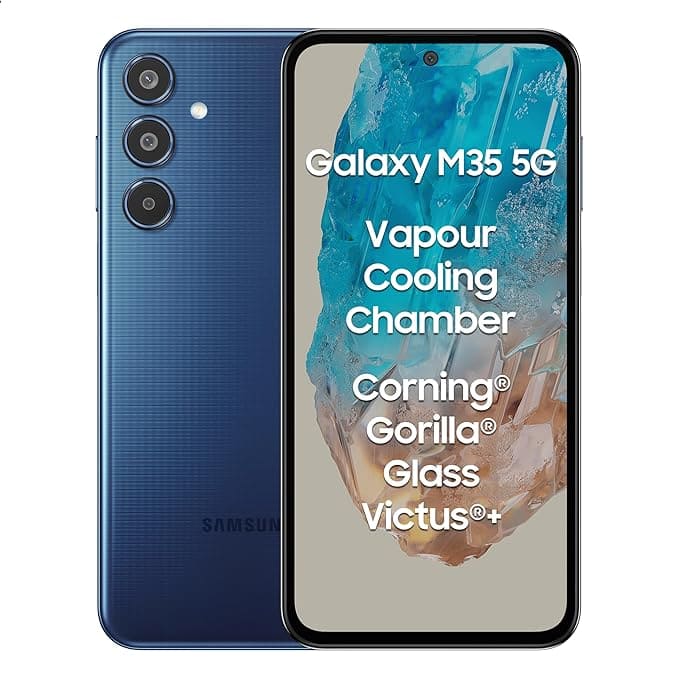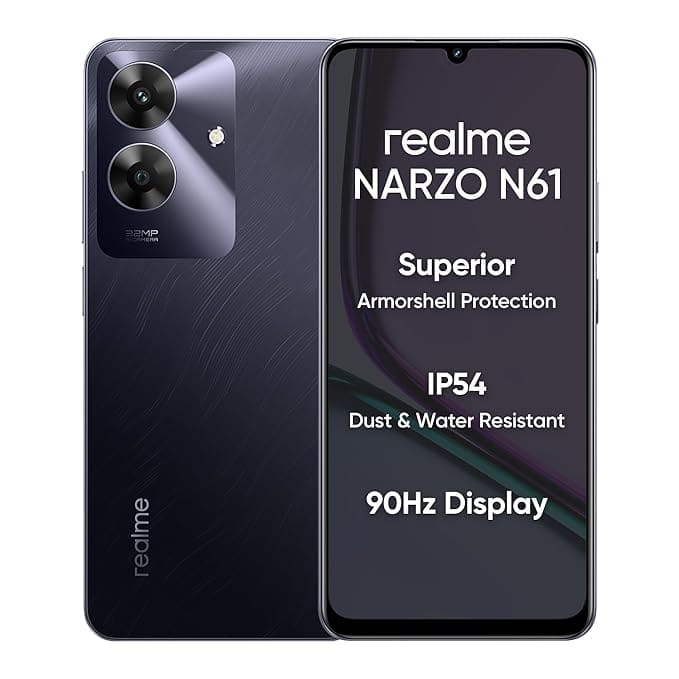English : Term 1 Unit 2 : My Hobbies
UNIT 2
My Hobbies
Gardening is my hobby. What is yours?
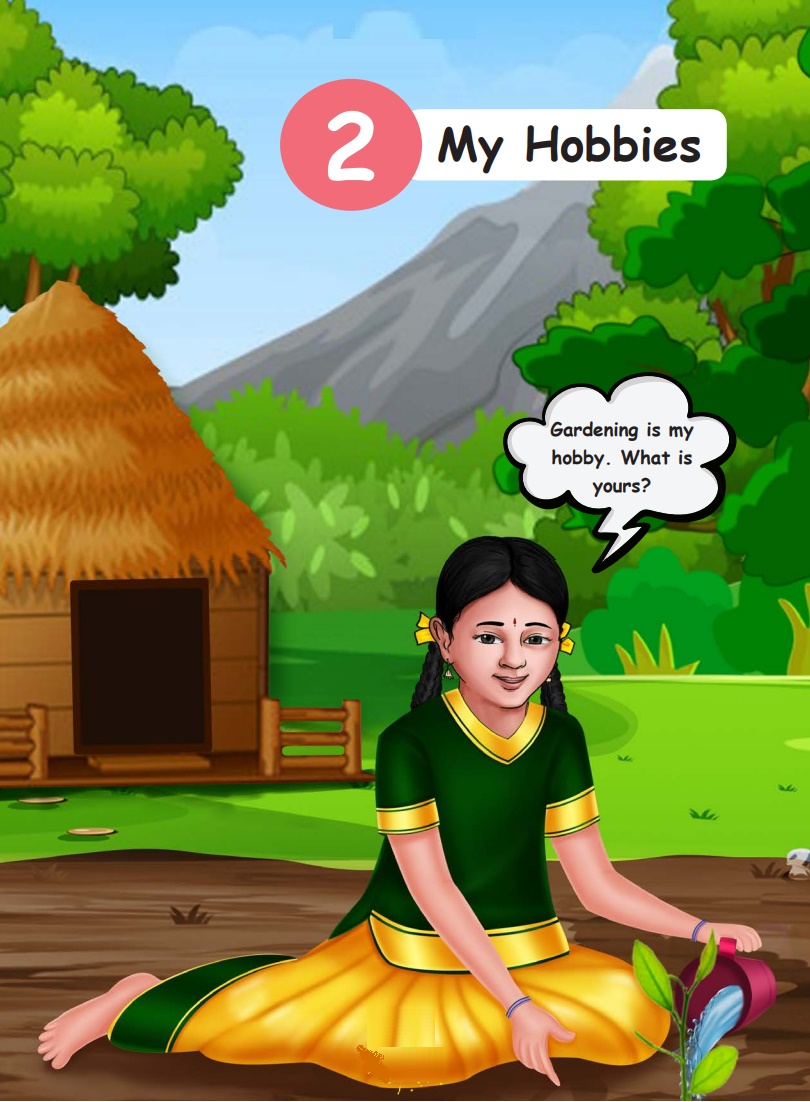
MY LITTLE PICTIONARY
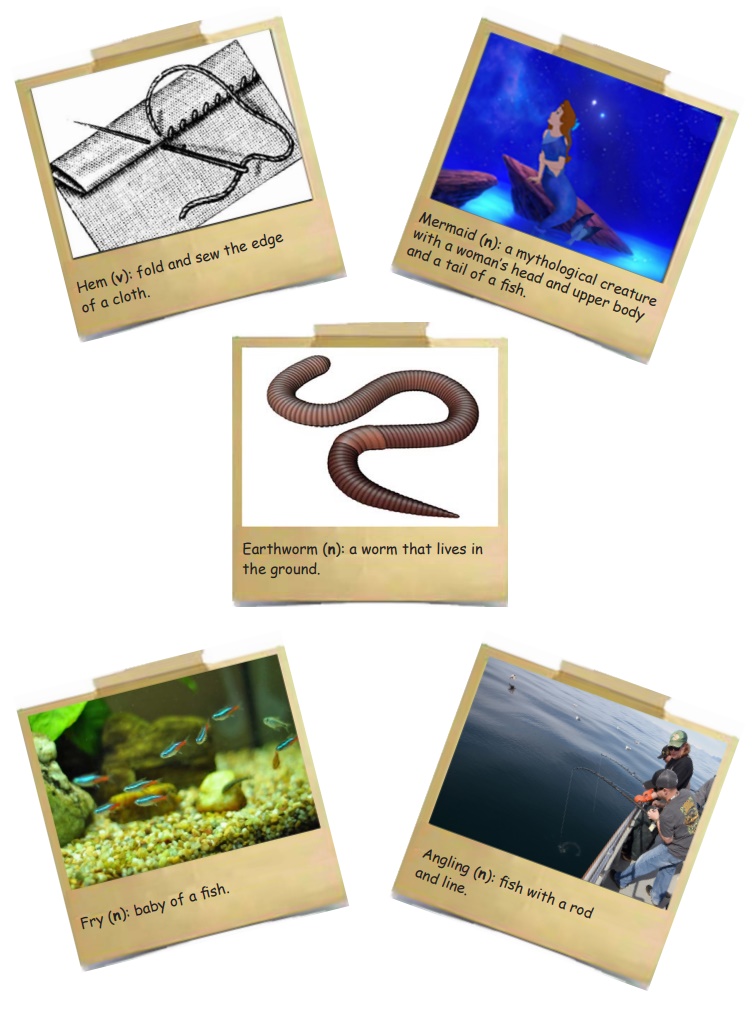
LET US LEARN
Do It Yourself
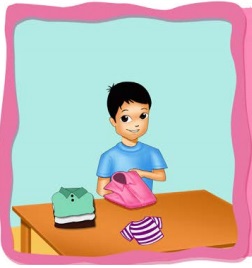
Hi, I am Vinoth.
When I was young, my parents and other elders did everything for me. Now
● I wash my own clothes.
● I fold all clothes neatly.
● I love to do my work on my own.
● I am a DIY kid.
Okay… Let me introduce my friends and their hobbies.
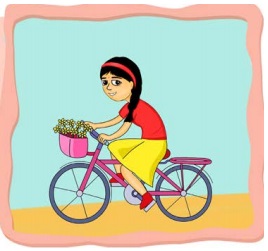
Hi, I am Rosy.
● I learnt to ride a bicycle when I was 9 years old.
● I ride my bicycle every day.
● I enjoy cycling.
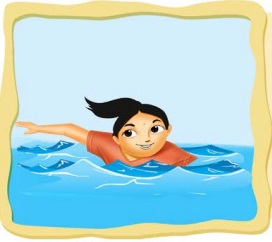
Hi, I am Megalai.
● I swim with elders in a well.
● I compete with them.
● I am fond of swimming.
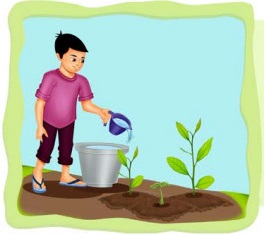
Hi, I am James.
● I have my own garden.
● I water it every day.
● I love gardening.
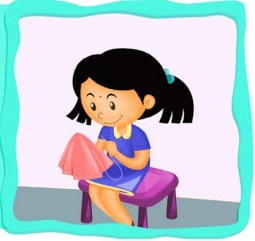
Hi, I am Aliya.
● I sew my torn clothes.
● I hem the border.
● I am always keen to stitch.
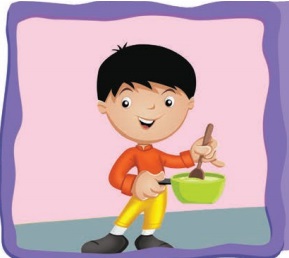
Hi, I am Raju.
● I help by cleaning grains and cereals.
● I am good at cooking.
● I like slicing, cutting or chopping fruits and vegetables.
● I prepare a few simple dishes.
Glossary
DIY kid : Do It Yourself kid. Someone who does any work on their own
Sew : making stitches with a needle
Cereals : grains used for food
slicing : cut into slices
LET US UNDERSTAND
A. Match their hobbies.
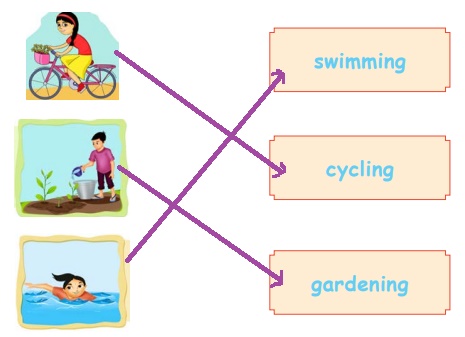
B. Choose the correct answers.
1. ____________ is a Do It Yourself kid.
a. Amuthan
b. Vinoth
c. Arasan
Answer: b. Vinoth
2. Rosy ____________ a bicycle.
a. rides
b. folds
c. swims
Answer: a. rides
3. Raju loves ____________.
a. cycling
b. driving
c. cooking
Answer: c. cooking
C. Answer the following questions.
1. Who sews the cloth? Aliya sews the cloth.
2. What does Megalai do with elders? Megalai swims with elders in a well.
3. How does Raju help his mother? How? Raju helps his mother by cleaning grains and cereals,
4. What does DIY kid refer to? It refers to Do It Yourself kid,
5. What is your hobby? Reading is my hobby
LET US BUILD
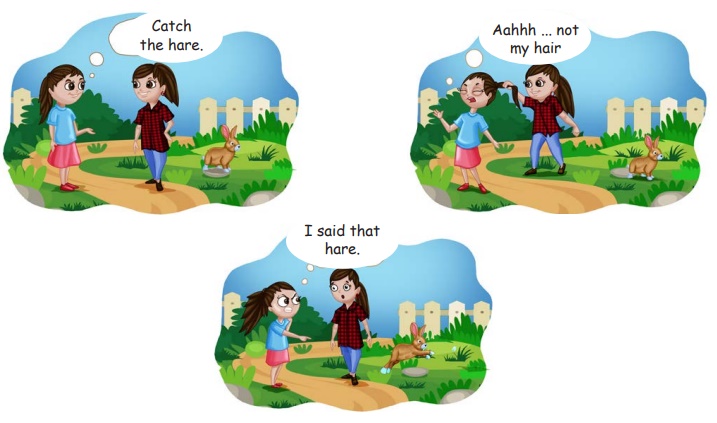
What do you think happened there?
She got confused between  and
and  .
.
These two words sound the same but their spelling and meaning are different.
Such words are called homophones. There are many homophones.
Come, let us learn a few!
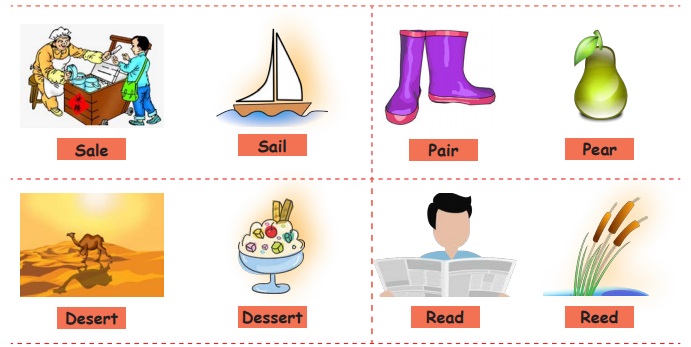
A. Look at the picture and tick (✔) the correct word.
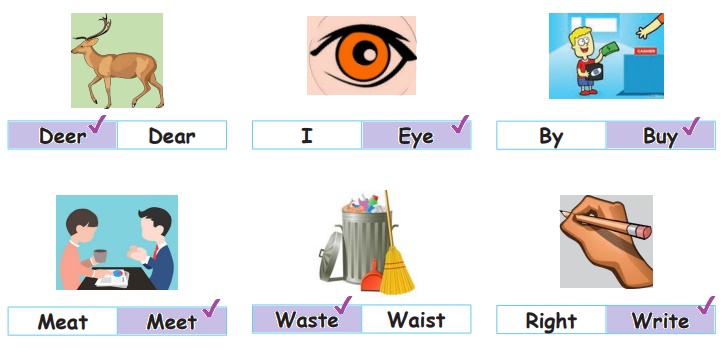
B. Connect and write the homophones in the box.
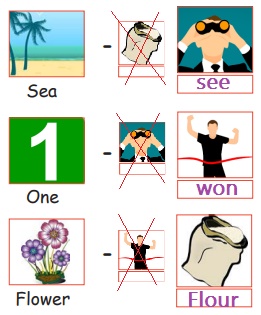
C. Write the homophone for the given word and draw the picture.
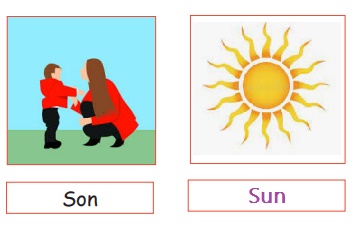
D. Pick out the correct option from the given homophones.
1. I saw a bee (be / bee) on the flower.
2. The wind blew (blew / blue) off the leaves.
3. What did you buy (buy / by) at the store?
4. You should never lie (lye / lie) to your parents.
LET US SING
Treasure Trove
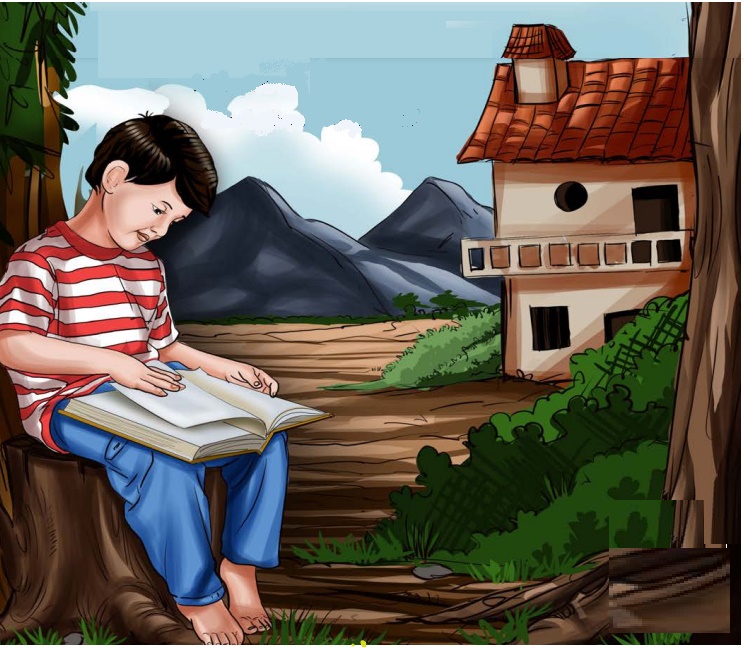
Read when you are happy,
Read when you are sad,
Learn about space, land on Mars,
Picture an auto race, zoom with cars.
A glance at history, go back in time,
To discover a mystery, solve a crime,
Read about the lost bicycle, where can it be?
Visit a lovely mermaid under the sea.
Read when you are happy,
Read when you are sad.
Glossary
Space: beyond earth
zoom: travel quickly
glance: look
discover: find
mystery: strange (or) unknown thing
mermaid: an imaginary creature
A. Answer the following questions.
a. What would we do when we are happy or sad?
When we are happy or sad we should read books.
b. When do we land on Mars?
When we read about space we land on Mars.
c. Why do we discover a mystery?
We discover a mystery to solve a crime.
d. Where did we visit a mermaid?
We visit a mermaid under the sea.
e. Why should we read?
We should read to learn a lot about things around us.
B. Pick out the rhyming words from the poem and write.
Mars – cars
time – crime
be – sea
LET US KNOW
Simple present tense is used to describe habits, unchanging situations, general truths and planned actions. The simple present tense is easy to form. We all know verbs have forms. Those are

The present form is used in simple present tense. Come let us use it.

• For I, we, you and they, present form is used.
• For he, she and it, s is added to the present form.
Give the correct verb form for following sentences.
 I go to school.
I go to school.
 You go to school.
You go to school.
 We go to school.
We go to school.
 He goes to school.
He goes to school.
 It goes to school.
It goes to school.
 She goes to school.
She goes to school.
 They go to school.
They go to school.
We saw simple present tense for action verbs. Let us see the simple present tense for ‘be’ verbs. ‘Be’ verbs show a state of being.
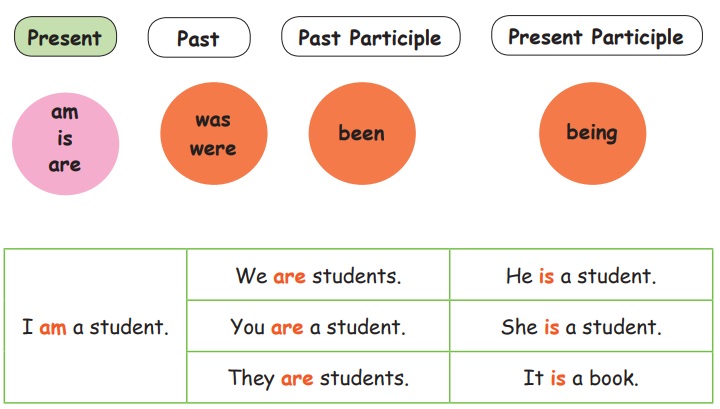
• ‘am’ is used for I
• ‘are’ is used for we, you, and they
• ‘is’ is used for he, she, it.
Give the correct verb form for following sentences.
 I am a doctor.
I am a doctor.
 It is a car.
It is a car.
 We are police.
We are police.
 They are football players.
They are football players.
 You are an engineer.
You are an engineer.
 She is a driver.
She is a driver.
 He is a carpenter.
He is a carpenter.
Let us see when to use the simple present tense.
Habitual actions.
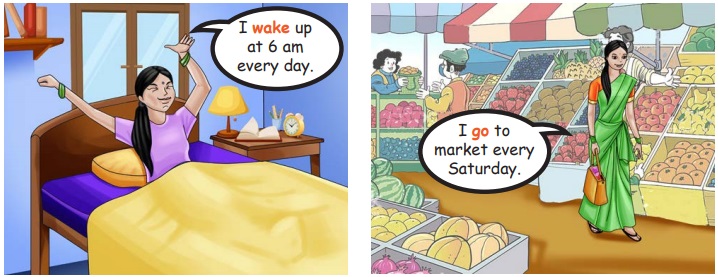
I wake up at 6 am every day.
I go to market every Saturday.
General truths.
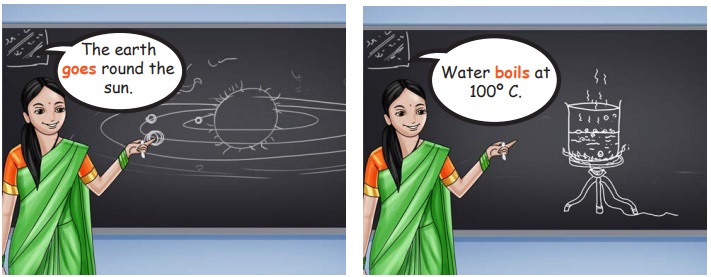
The earth goes round the sun.
Water boils at 100º C.
Unchanging situations.
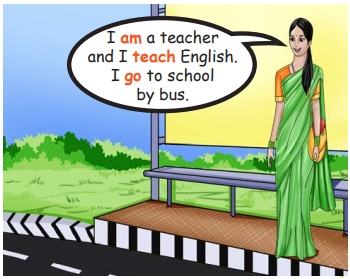
I am a teacher and I teach English. I go to school by bus.
Planned actions.
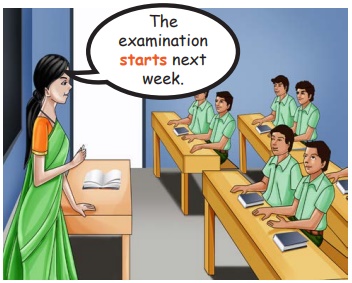
The examination starts next week.
A. Use the suitable verb.
( Read reads )
I read the book.
Banu reads the lesson.
Suresh reads the poem.
We read loudly.
My friends read a passage.
My father reads the news.
The boy reads the story.
You read the instruction.
The robot reads some words.
B. Circle/underline the correct word.
1. Boy like / likes the cake.
2. We come / comes home at 4 p.m. every day.
3. The birds fly / flies in the sky.
4. You comes / come late to school.
5. It run / runs very fast.
C. Rewrite the sentences using the words in the brackets.
1. I go to school at 8 ‘o’ clock. (He)
He goes to school at 8 o’clock.
2. We play cricket on Sundays. (Aravind)
Aravind plays cricket on Sundays.
3. I watch tv in the afternoon. (My mother)
My mother watches TV in the afternoon.
4. They visit their friends in the evenings. (Kavitha)
Kavitha visits her friends in the evenings.
5. I have dinner at 8 p.m. (She)
She has dinner at 8 p.m.
Fill in the blanks.
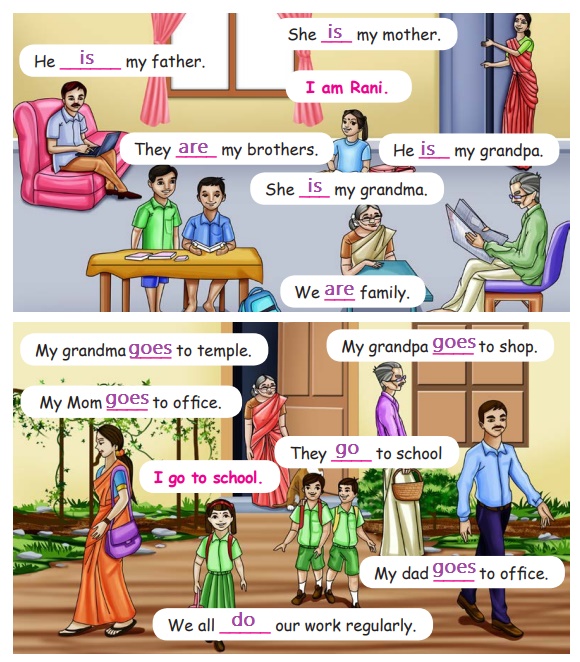
She is my mother.
He is my father.
I am Rani.
They are my brothers.
He is my grandpa.
She is my grandma.
We are family.
My grandma goes to temple.
My grandpa goes to shop.
My Mom goes to office.
They go to school
I go to school.
My dad goes to office.
We all do our work regularly.
LET US LISTEN
Listen to the audio and answer the riddles.
Who am I?
1. ___________
2. ___________
3. ___________
4. ___________
5. ___________
Note to the teacher: Scan the QR code to listen to the audio. Let the children listen to the audio and answer the question.
LET US SPEAK
What’s your lunch today?
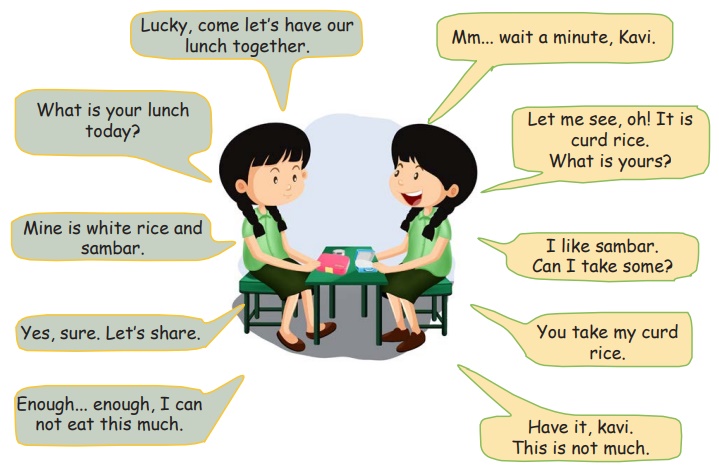
Lucky, come let’s have our lunch together.
Mm… wait a minute, Kavi.
What is your lunch today?
Let me see, oh! It is curd rice.
What is yours?
Mine is white rice and sambar.
I like sambar.
Can I take some?
Yes, sure. Let’s share.
You take my curd rice.
Enough… enough, I can not eat this much.
Have it, kavi. This is not much.
Structures that are useful for this situation.
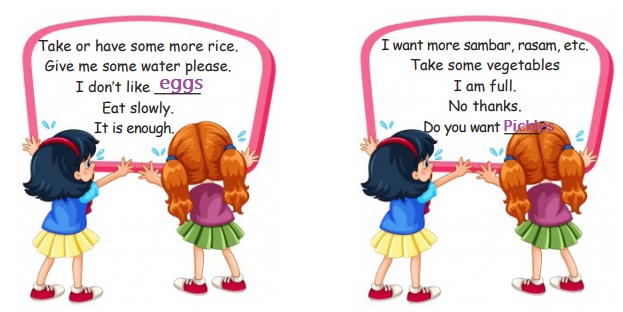
Take or have some more rice. Give me some water please. I don’t like eggs Eat slowly. It is enough.
I want more sambar, rasam, etc. Take some vegetables I am full. No thanks. Do you want Pickles ?
Note to the teacher: Make children practise these structures and encourage them to use them during their lunch time. You can also practise with different situations like breakfast and supper.
LET US READ
ANBU AND THE FISH
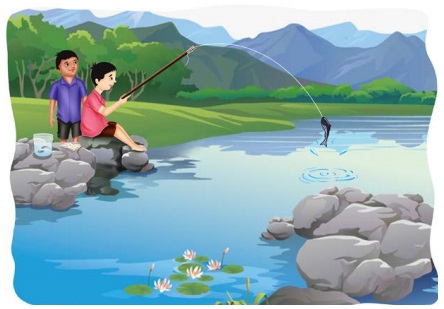
Anbu was very talented in catching fish. He always went to catch fish with Madhan. They usually used dhoti as a net to catch the fish. Anbu also made fishing rods using sticks and thorns at home.
Then, they shared the fish equally. Unlike their friends, Anbu and Madhan, were always careful while fishing. They never went deep into the pond or river. Every Sunday they would go in search of earthworms to use them as bait. They enjoyed searching for earthworms. Once, the bait was ready they would go fishing.
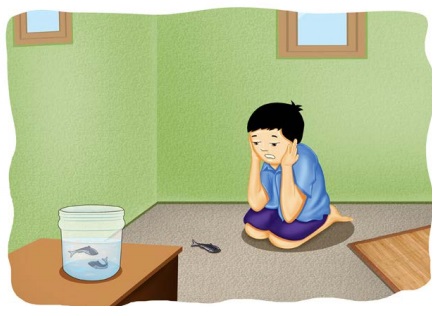
On one Sunday, Anbu was not happy. They were able to catch only three fish. The fish were very small to cook. Madhan told him to grow the fish at home. Anbu filled the jar with water and let the three fish into it. The fish exerted and swam in different directions. Anbu thought the fish was hungry and dropped earthworms into the jar. But to his surprise, the fish did not eat. He saw their eyes and could feel their fear.
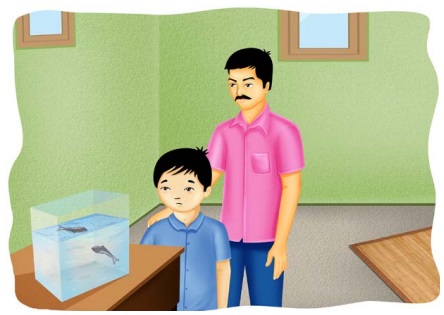
Next morning, he went straight to the fish jar from his bed. He saw only two fish in the jar. He searched for the fish everywhere. Then, he saw one fish on the floor. Anbu was very sad and his father consoled him. In the evening, his father got a new fish tank. Anbu changed the fish to the new tank.
The next day, Anbu rushed back from school to the tank. He saw that one more fish was dead and floating on the top. He started crying. His father said, “These fish live in the river and lake. Nature is their home. It is best to let them be free.” He saw the last fish swimming alone, and he felt bad. He took the fish to the same pond and set it free.
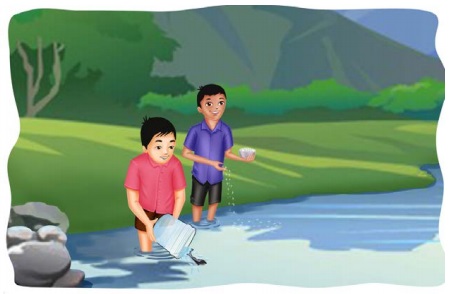
From then on, Anbu and Madhan bought a packet of puffed rice and fed the fish. Feeding fish was their new hobby.
Think: Discuss whether Anbu and Madhan will go fishing when the water overflows in a river or a lake.
A. Choose the correct answer.
1. Anbu was talented in catching _____________.
a. butterfly
b. hen
c. fish
Answer: c. fish
2. Every ___________ they would go fishing.
a. Sunday
b. Monday
c. Friday
Answer: a. Sunday
3. Anbu got ________ fish this week.
a. one
b. two
c. three
Answer: c. three
4. They use __________ as bait.
a. earthworm
b. caterpillar
c. butterfly
Answer: a. earthworm
5. They fed fish with ___________ .
a. rice
b. puffed rice
c. groundnut
Answer: b. puffed rice
B. Answer the following questions.
1. What did they use as net?
They used a dhoti as net.
2. Why was the fish floating on top?
The fish was dead. So it was floating on top.
3. What was their new hobby?
Feeding fish was their new hobby.
C. Identify the character/speaker.
1. He set the fish free. Anbu
2. “Grow the fish at home, Anbu.” Madhan
3. He bought a new fish tank. Anbu’s father
LET US READ ALOUD
Read the passage three times and colour a hen for each time.
A little
red hen had some wheat seeds. “Will you help me sow this seed?” asked the hen,“No” replied the selfish dog. Then the hen did it by herself. The seeds grew into a field of wheat. “Will you help me reap the wheat?” asked the hen, “No” replied the sleepy cat. She did it by herself. “Will you help me grind the wheat?” asked the hen, “No” replied the noisy duck. She did it by herself. “Will you help me make a bread?” asked the hen, “No” replied the lazy cow. She made the bread by herself. “Will you all help me eat this bread?” asked the hen, “Yes” replied everyone, “No” said the hen.
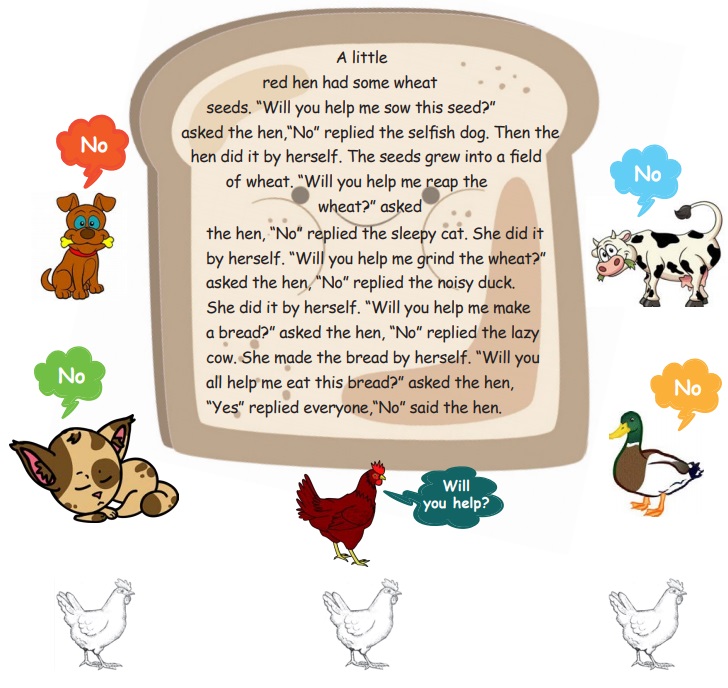
Find the qualities of these animals from the passage.
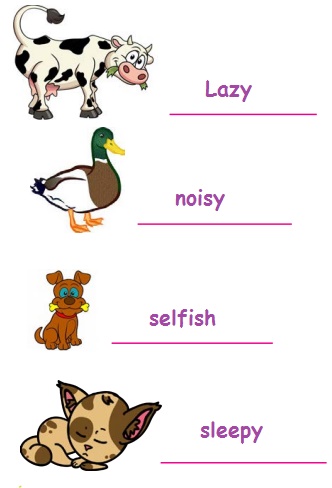
LET US WRITE
Letter writing
From
S. Varshni,
IV std ‘A‘ sec,
PUPS Chakkaramallur.
To
The class teacher,
IV std ‘A‘ sec,
PUPS Chakkaramallur.
Sir/Madam,
As I am suffering from fever, I am unable to come to school. So I request you to grant me leave for one day on 21-06-2019.
Thanking you,
Yours sincerely,
S. Varshni
S. VARSHNI.
Write a letter to your class teacher asking leave for attending marriage function.
Leave Letter
From
______
To
_____
Sir/Madam,
Thanking you,
Yours obediently,
Note to the teacher: Help the children write their own leave letter for different situations for their portfolio.
I Can Do
A. Choose the correct option.
1. Raju is good at cooking.
a. Raju
b. Vinoth
c. Megalai
2. Aliya hem the border.
a. James
b. Aliya
c. Raju
B. Look at the picture and tick (✔) the correct word.
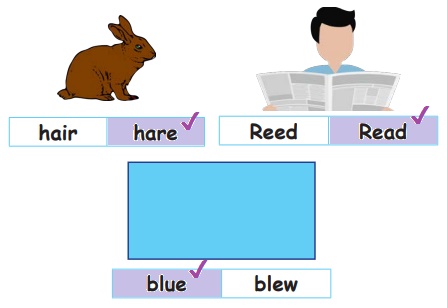
C. Match the rhyming words.
mars – crime
bed – cars
time – head
Answer:
mars – cars
bed – head
time – crime
D. Recite the poem ‘Treasure Trove’ with the correct intonation.
E. Give the correct verb form using come.
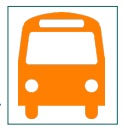
a. I come by bus.
b. They come by bus.
c. He comes by bus.
d. She comes by bus.
F. Circle or underline the correct word.
a. It run/runs very fast 
b. The birds fly/flies in the sky. 
Learning Outcome
Now I can…
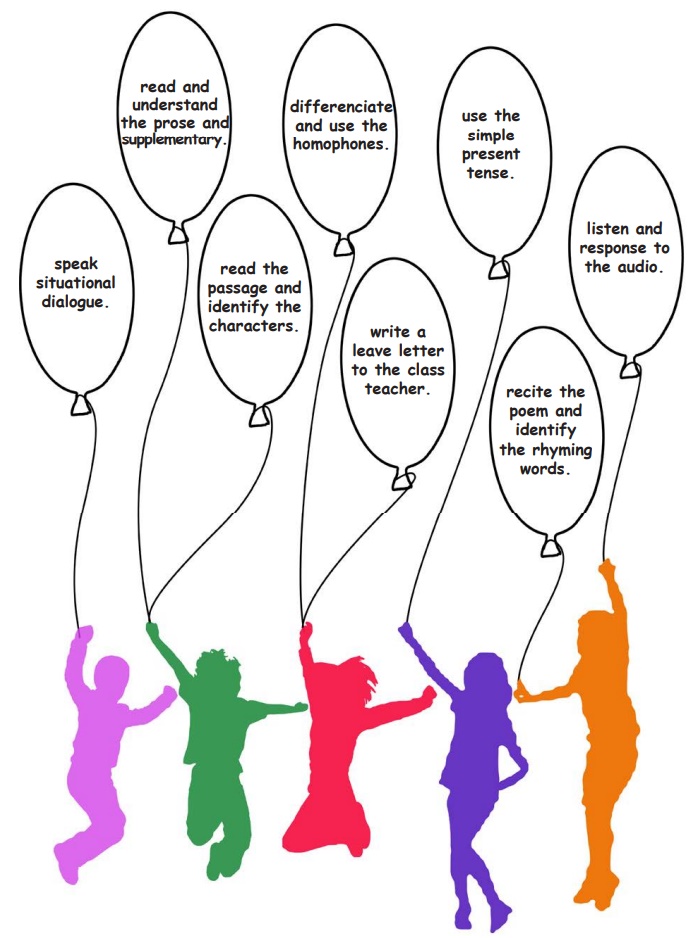
read and understand the prose and supplementary.
Differenciate and use the homophones.
use the simple present tense.
listen and response to the audio.
speak situational dialogue.
read the passage and identify the characters.
write a leave letter to the class teacher.
recite the poem and identify the rhyming words.
Note to the teacher: Ask children to colour the balloon when they achieve the learning outcome.













